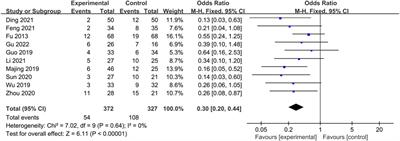Exploration of the Mechanism of Traditional Chinese Medicine for Anxiety and Depression in Patients with Diarrheal Irritable Bowel Syndrome Based on Network Pharmacology and Meta-analysis
The efficacy of Chinese herbal medicine (CHM) in managing irritable bowel syndrome with diarrhea (IBS-D) accompanied by anxiety and depression remains uncertain.

Thus, a systematic review was carried out employing meta-analysis and network pharmacology to ascertain the efficacy and underlying mechanisms of CHM therapy.: By conducting a systematic review, including literature search, screening, and data extraction, we identified 25 randomized controlled trials to assess CHM's effectiveness in treating irritable bowel syndrome alongside anxiety and depression. Network pharmacology was utilized to scrutinize the metabolite utility of CHM in addressing this condition. Potential primary mechanisms were synthesized using information sourced from the PubMed database. Results: Twenty-five studies, including 2055 patients, were analyzed, revealing significant treatment efficacy for IBS-D in the trial group compared to controls (OR = 4.01, 95% CI [2.99, 5.36], I 2 = 0%). Additionally, treatment for depression (SMD = -1.08, 95% CI [-1.30, -0.86], P<0.00001, I 2 = 68%; SDS: SMD =-1.69, 95% CI [-2.48, -0.90], P<0.0001, I 2 = 96%) and anxiety (HAMA: SMD =-1.29, 95% CI [-1.68, -0.91], P<0.00001, I 2 = 89%; SAS: SMD =-1.75, 95% CI [-2.55, -0.95], P<0.00001, I 2 = 96%) significantly improved in the trial group. Furthermore, the trial group exhibited a significantly lower disease relapse rate (OR = 0.30, 95% CI [0.20, 0.44], P<0.00001, I 2 = 0%). CHM treatment consistently improved IBS severity (IBS-SSS) and symptom scores. Network pharmacology analysis identified key chemical metabolites in traditional Chinese medicine formulations, including Beta-sitosterol, Stigmasterol, Quercetin, Naringenin, Luteolin, Kaempferol, Nobiletin, Wogonin, Formononetin, and Isorhamnetin. Utilizing the STRING database and Cystoscape v3.9.0 software, a protein-protein interaction (PPI) network revealed the top 8 key targets, implicated in anti-inflammatory responses, antioxidant stress modulation, and neurotransmitter homeostasis maintenance. Conclusion: Chinese Herbal Medicine (CHM) offers a promising and safe treatment approach for patients dealing with Diarrheal Irritable Bowel Syndrome (IBS-D) accompanied by anxiety and depression; thus, indicating its potential for practical implementation.
The most active metabolites of CHM could simultaneously act on the pathological targets of IBS-D, anxiety, and depression.
The diverse scope of CHM's therapeutic role includes various aspects and objectives, underscoring its potential for broad utilization.
Read the full article at the original website
References:
